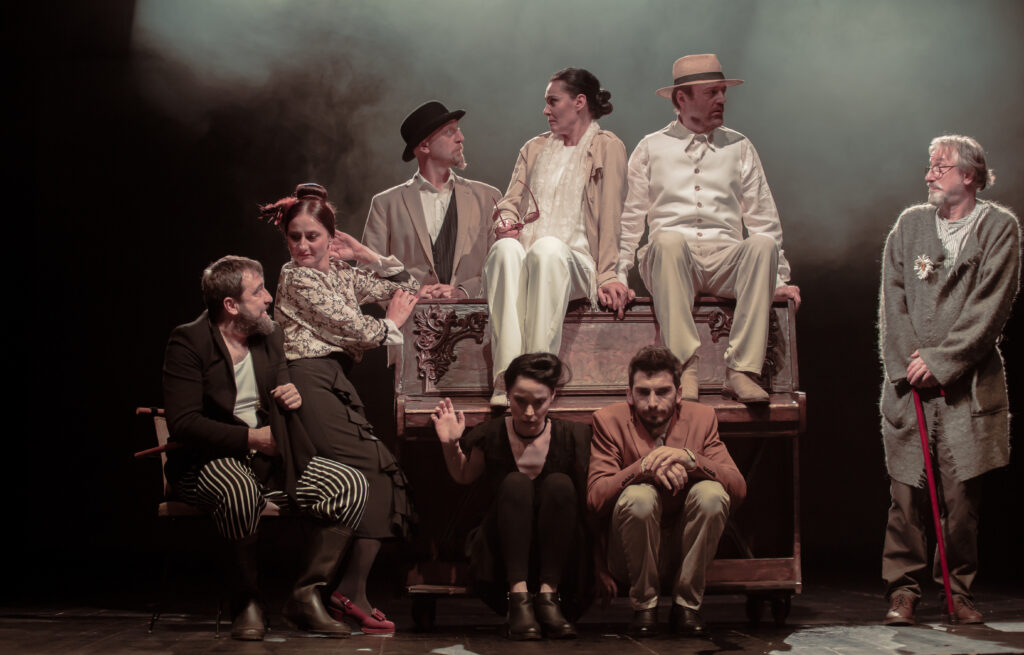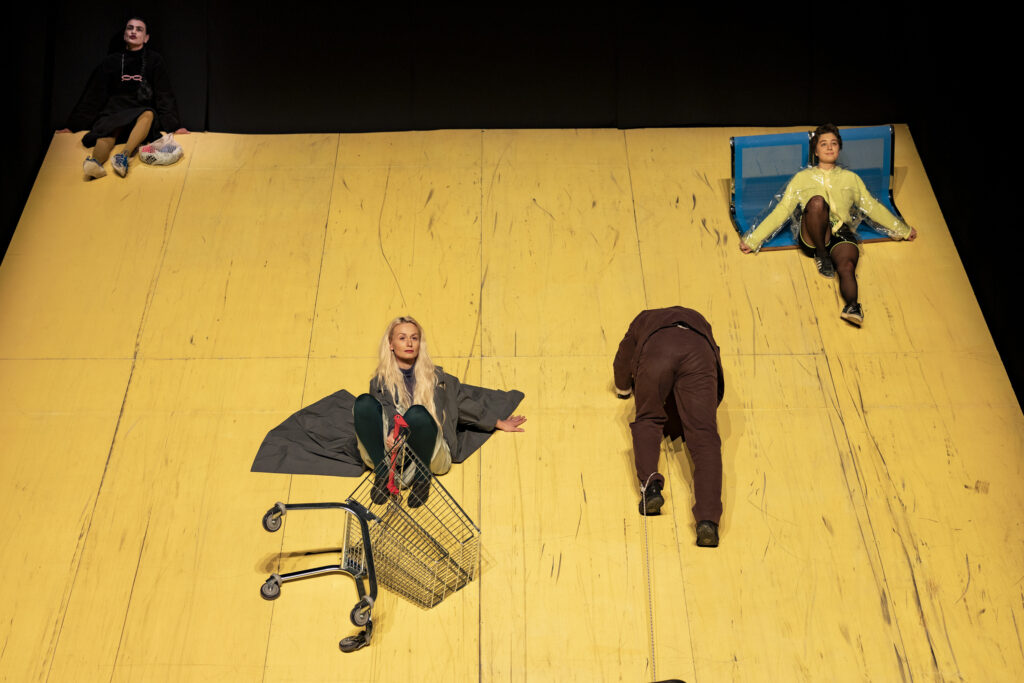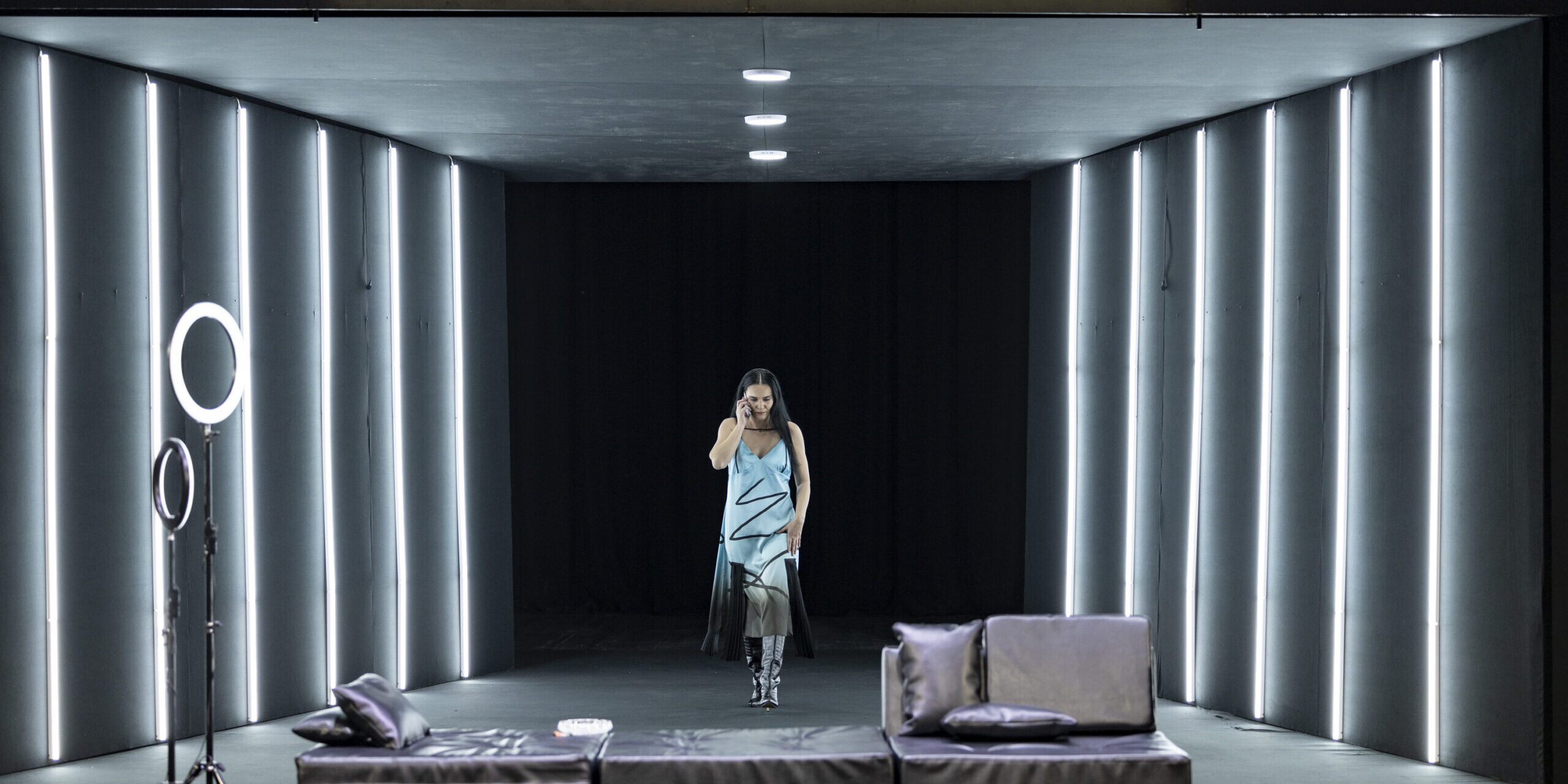Following the recent showcase at the New Theatre, Tbilisi, Nick Awde explores how the theatre has transformed itself into one of Georgia’s most cutting-edge cultural spaces.
Cultural institutions are slow to change – it’s in their nature – and state theatres are no exception, particularly those with an origin story from Communist times (but not all!). Generally resistant to political and economic upheavals by virtue of their monolithic anatomy, their foundations were shaken by Covid like the rest of the theatre world and suddenly we heard voices in high places talking loudly about reimagining and reinventing the system.
And then not much happened. In Tbilisi however, there was one state theatre that took the plunge and metamorphosed into a modern cutting-edge cultural platform.
Admittedly the New Theatre was already making a name for itself as an innovative space under artistic director David Doiashvili. It began life in 1926, in the Socialist Soviet Republic of Georgia, as the Vaso Abashidze Music and Drama State Theatre, whose ensemble was pumping out a rotation of safe musical comedies long before Doiashvili took over the reins in 2004.
He pushed experimentation while expanding the genres from a solid core of drama ranging from King Lear and Oedipus Tyrannus (which launched the New Theatre in 2021) to The Pillowman and The House on the Border. His reputation as director has taken him to work in Europe – he is currently directing Schiller’s Intrigue and Love at Hungary’s National Theatre where he has two productions already in repertory, A Midsummer Night’s Dream and Cyrano de Bergerac.
Covid provided an unexpected opportunity to make a complete break with minimum risk of upset. “Our original building needed renovation,” says Doaishvili, “and we were fortunate that during the pandemic the building that we are currently in was assigned to us – it was part of the National Music Centre. Because everything stopped in lockdown, we decided to stay and renovate here, it took two years and we never moved back.”
With the lifting of Covid restrictions, the theatre opened its doors to reveal a spacious foyer bar, hi-tech stage and rehearsal spaces. However, fear of losing the audience from the old building was a huge concern, says Doiashvili. “It’s hard for audiences to go to a new place if many of them have got used to seeing their theatre just as a place to be entertained. But we had spent a year during Covid developing new work which aimed to show everyone that we really are a new theatre, where actors can play the tragedy of King Lear one day and sing and dance in a Georgian musical the next. The driving idea was to find a cast who can be universal actors.”
Things have been taking shape step by step in a process that started with three productions – Macbeth and two Georgian musicals The Separation (Gaqra) and I Will Cross the Sea (Me Gadmovtsurav Zghvas), based on the songs of the late poet/musician Irakli Charkviani – which Doiashvili used to explore the technical possibilities offered by the new stage. “I’m pleased to say that we proved what we wanted to do almost overnight, and within two months of opening we had our old audience back and our new audience.”
Creating shows and running a building are very different animals, but key to both is attracting talented people who share the same vision. At the New Theatre from backstage and front of house to ensemble and creatives there is a vibrant mix of new faces alongside people who have been working there for years. “We’re sharing all our experiences to build a new generation for theatre,” says Doiashvili, “That’s absolutely key to how we are building the theatre’s success.”

The Seagull, New Theatre, Tbilisi
Enough new shows have been added to the repertoire to be confidently shared with the rest of world via the Georgian New Theatre Showcase Festival 2024. Its programme balanced productions by young directors, such as Mikheil Charkviani’s Bunker, alongside works by more established directors, such as Davit Mghebrishvili’s The Bitter Tears of Petra von Kant and Daioshvili’s The Seagull.
The plays involve very different takes on staging, further highlighting the break with the old state theatre’s hallowed repertory – surely creating ripples of dissent if not in society then in the industry. “Not at all,” says Doiashvili. “There’s a bigger picture because the decision to change was taken during the pandemic. Covid changed so many things in all our lives, it changed our relationships with each other, and I think stage performance is also very different from how it was before Covid. All the things we wanted to say before in theatre somehow felt meaningless when we came back.”
Another factor is that when the pandemic arrived, theatre in Georgia was no longer as popular or influential as it used to be. “It’s interesting what happened next,” says Doiashvili. “After the pandemic, people wanted to go out and be somewhere where they could express themselves and to get in close contact with art. The theatres have had a huge boost because of this.”
The Showcase productions are good examples of how to channel that boost without playing it safe, says Doaishvili. “Even though people may not accept what our directors are able to easily see, we have to start preparing audiences to be open to new approaches, to expand their awareness by simply showing them these approaches. Because, let’s face it, Georgian theatre audiences are still extremely conservative.”
Those conservative elements, however, are also facing the tastes and beliefs of the younger generations, citizens with no direct experience of Soviet times and increasing numbers of them born long after Georgia gained independence in 1991. Cumulatively, both sides held the key to the New Theatre’s overnight success – which must have triggered second album syndrome, i.e. how to quickly follow up with new product. “That’s exactly what happened,” says Doiashvili. “Suddenly we had to start coming up more new productions as fast as we could. Obviously we couldn’t handle it all in-house and that’s when we started inviting Georgian directors who we think are interesting, who have something to say and whose ways of expression are also different from each other.”
Because a commitment to updating the New Theatre repertoire is essential to stepping away from the traditional state theatre model, the man who has to make the chop deserves our sympathy. “We’ll be getting to around twenty plays in the repertoire this year and we’re aiming to add five new productions per year,” says Doiashvili. “So far we haven’t dropped a show entirely from the repertoire, but we will soon have to start saying goodbye to the earlier productions.”
Part of the Showcase programme was Bunker, based on Iva Pezuashvili’s novel of the same title. In his adaptation, director Mikheil Charkviani embarks on a highly charged political exploration of Georgian society that could be problematic to stage elsewhere in the country. Set in the 90s, it’s an unsettling yet raucous look at how Armenians, Azerbaijanis and Georgians lived during a period when life was anarchic and unstable at every level.
“With a play like this we can mirror what’s going on around us today,” says Doiashvili. “Of course, for the government and the ministry of culture we’re far too loud and they’re not exactly fond of the messages that we’re expressing. But theatre needs to resonate with what’s going on in the country and within ourselves.
“Other theatres have started to follow, and that makes me happy. Whenever I can, I try to see as many of the shows going on in other venues, including the independent theatres who don’t have budgets but have great ideas and spirit. I’d love to bring together everyone making independent theatre to see what we can do here because we always have to look out for new languages in theatre.”
There’s the danger that you might stifle a language if you codify it, and while Doiashvili admits that you can’t always make a new language spark on stage, he’s very happy when it works. A good example is when he invited Grigol Nodia to work with the theatre. “We knew that he was a young theatre director who doesn’t work on a traditional stage but in locations like rooftops or forests. He never wanted to direct in a theatre, his vision is that you should take theatre anywhere but a stage.”
After a long time throwing around ideas, Doiashvili pointed out that if theatre could be anywhere then logically why couldn’t it also be on the New Theatre stage? Nodia agreed and his take on Antigone is the result. Since his language is radically different from the current norm in Georgian theatre, when it was first performed in front of an audience, they started to leave.
“They left because they couldn’t understand what they were seeing. Not because the production was bad but because it was shocking, they weren’t expecting to see that here. That’s good because now our audience don’t come expecting to see what they already know, they come knowing that they can see anything.”
Alienating audiences is risky, given Georgia’s economic and political instability where adequate funding is a constant distraction, but Doiashvili’s approach to this is pragmatic: “We are a state theatre, therefore we have state funding – but it is not even close to being enough to support what we’re doing. At the moment box office is the only way for us to survive and fund our ideas. So we became the first theatre in Tbilisi to raise our ticket prices, and this is because I don’t think the prices before were equivalent to the work we produce. We think the new prices reflect the economics of putting theatre on stage.”
In taking this difficult step, the theatre has been mindful of excluding those who cannot afford the new tickets and for each show it offers low-price seats. The range is wide in any case so there’s lots of choice in a system that is very different from what the other state theatres are offering. As Doaishvili says: “Even though the prices are higher, the audience thinks it’s worth paying more because they know it’s worth it. We have premieres coming up regularly now and some of them are selling out in minutes. People have no idea what’s going to happen, but they’re expecting something worthy of being staged.”

Dying as a Nation, New Theatre, Tbilisi
Another vulnerable area is the subject matter of the shows. Does putting political and social commentary on a state stage risk provoking a violent reaction? Or, if it doesn’t come to that, is this at least a case of biting the hand that feeds you? In answer, Doiashvili again points to the bigger picture: “The main problem for Georgians right now is the lack of stability, which is caused by having a government that is anything but stable. So we are used to the fact that everything can change within literally seconds. At the moment the situation is changing so drastically and rapidly, especially in politics. Just three days ago everything shifted radically with everyone expecting that the entire cabinet would resign and then it turned out that now they’re staying.
“In the 90s, when we had the terrible economic crisis, when everyone was left jobless, men were too ashamed to admit they didn’t have work. So they would get up, get dressed and leave the house to gather by bridges in Tbilisi where they would wait for people to drive up and offer them a day’s work. This has become a metaphor for Georgians in our current situation. There’s the fear and the expectation that everything is changing, that it can go extremely well or extremely badly. The New Theatre sets out to create a message of stability and to share it so people have the expectation that when they come, they will see something fixed that will engage them and make them think.”
However this expectation is not a guarantee that the audience will accept what they see. Like Mikheil Charkviani’s version of Dimitris Dimitriadis’ politically charged Dying as a Nation, where there is a scene of an actor smashing up a TV while it broadcasts a real-life interview with the now-ex Georgian prime minister. “It’s a truly disgraceful interview,” says Doaishvili, “and yet some people feel they have to leave the theatre in protest. We accept that, because the theatre hosts anyone, no matter their political views. We’re not afraid of expressing what we believe and we’re not afraid of you expressing what you believe. Right now, right here in Georgia, theatre is a place to express not impress.”
For more information, visit: newtheatre.ge
Nick Awde is a journalist, playwright, editor, critic and producer. Based in the UK, he is co-director of Morecambe's Alhambra Theatre. Books include Equal Stages (diversity and inclusion in theatre), Mellotron, Women In Islam, and translations of plays by other writers. Much of his work focuses on ethnoconflict and language/cultural genocide.








